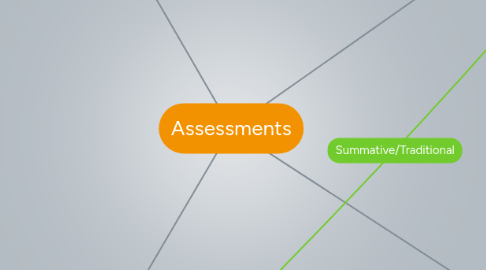Assessments
by Tammy Roberson


1. Traditional
1.1. standardized formatting for testing skills, and a variety of traits
1.1.1. one time measurement
1.1.2. single correct answer
1.1.3. statistical analysis and comparisons
1.1.4. one domain of knowledge or skill assessed
1.1.5. reliable/efficient
1.1.6. true scores
1.2. Cumalative exams
1.3. College placement exams
1.4. College prep exams
1.5. Semester and end of year exams
1.6. Benchmark Exams
1.7. Quizzes
1.8. Fill in the blank tests
1.9. True/False tests
1.10. Essays
1.11. Multiple Choice tests
1.12. Thesis
1.13. Dissertation
1.14. Intelligence tests
1.15. Behavioral assessments
1.16. Psychological assessments
1.17. Speech and language assessment
1.18. Cognitive assessment
2. Authentic
2.1. students demonstrate proficiency with a skill
2.1.1. performing tasks similar to real-world setting
2.1.2. long range products
2.1.3. learn by doing
2.1.4. teacher as collaborator
2.1.5. open-ended
2.1.6. multi-faceted
2.2. Reports
2.3. Essays
2.4. Research projects
2.5. Web logs
2.6. E-portfolios
2.7. Collaborative writing
2.8. Peer reviews
2.9. Self-assessment
2.10. Podcasts
2.11. Case Studies
2.12. Threaded Discussions
3. Summative
3.1. Occurs at end of instruction
3.1.1. unit tests
3.1.2. projects
3.1.3. surveys
3.1.4. certifies achievment
3.1.5. basis for assigning grades
3.2. College entrance exams
3.3. Certification exams
3.4. Exit exams
3.5. Benchmark exams
3.6. Literacy tests
3.7. End of semester/year exams
3.8. Advanced placement tests
3.9. International Baccalaureate
3.10. Surveys
3.11. Research projects
3.12. Presentations
3.13. Posters
3.14. Dissertation
4. Formative
4.1. occurs throughout and during instruction
4.1.1. redirects instruction
4.1.2. informal
4.1.3. teacher observations
4.1.4. probing questions
4.1.5. application exercises
